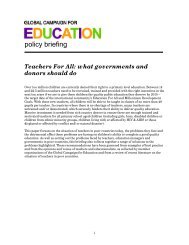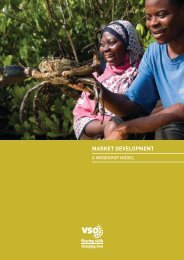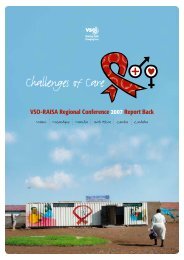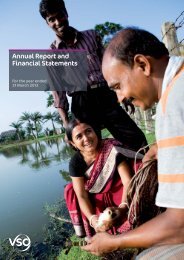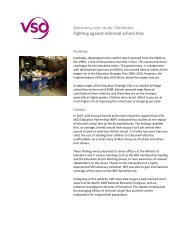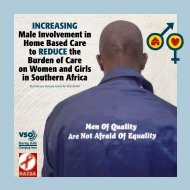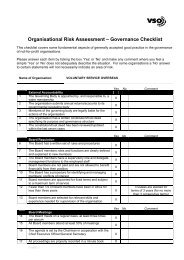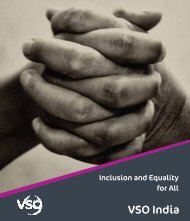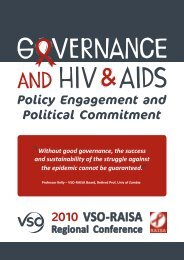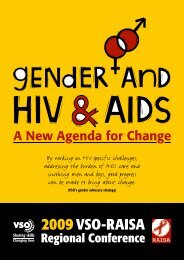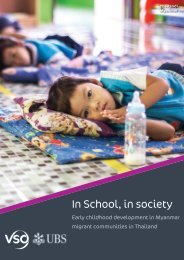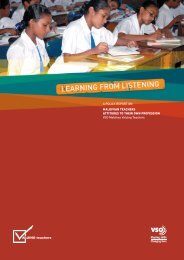imprisonment of <strong>the</strong>ir husbands and <strong>the</strong> consequentloss of income if <strong>the</strong>y reported sexual violence by <strong>the</strong>irpartners.” 49 Early marriage and relationships with ‘sugardaddies’ often represent a form of economic exchangewhich leave women and girls with little power. Insituations of extreme poverty, sex serves as a survivalstrategy, where women balance immediate needs offood or shelter with <strong>the</strong> more distant and abstractprospect of contracting a disease.This same economic dependency forces many womenand girls to disclose <strong>the</strong>ir HIV status and ask <strong>the</strong>ir malepartners or guardians for money for medication ortransport. 50 According to <strong>the</strong> Zimbabwe study, “somewomen living with HIV and AIDS had been deserted by<strong>the</strong>ir husbands,” and “many were facing problems inraising funds for AIDS treatment, including CD4 cellcounting services”. Even when her partner stands byher, such dependency can leave women morevulnerable to interruptions in <strong>the</strong>ir treatment. In Uganda,for example, “if <strong>the</strong> husband dies, most of <strong>the</strong> widowsare dependent and <strong>the</strong>ir lives change so abruptly”. 51In fact, socio-economic barriers are a major reasonwomen are unable to access treatment, care andsupport. In many countries, prohibitively high hospitalfees combined with o<strong>the</strong>r expenses are a major barrierto access. According to research in Nepal undertakenfor this report, “The major obstacles faced by <strong>the</strong>sewomen… are associated with regular cost toKathmandu, and to clinics for CD4 count and ARTcoupled with <strong>the</strong> time lost due to long travel time andfew days stay in Kathmandu and thus time lost fromregular income generation work and childcare.” 52The burden of HIV and AIDS care places a heavy tollon women and girls, affecting <strong>the</strong>ir financialproductivity, among o<strong>the</strong>r things. Up to 90% of care isprovided in <strong>the</strong> home, and <strong>the</strong> principal givers ofphysical and psychosocial support are women andgirls. 53 In one region in Ethiopia, for example, about85% of care providers (<strong>the</strong> majority of whom arewomen) spend <strong>the</strong>ir time providing care and supportto home-based patients and have no o<strong>the</strong>r sources ofincome to support <strong>the</strong>ir families. 54 It is often taken forgranted that such women will continue to provideunremunerated care and support to infected andaffected family and community members. Lesserknown is <strong>the</strong> cost of this care, how it affectseconomic, societal and familial relations, and – last butnot least – <strong>the</strong> women and girls <strong>the</strong>mselves (seeChapter 5).2.4. Recommendations Donor governments1) Donor governments should consult with women’smovements, local networks and movements ofwomen living with HIV and AIDS to ensure donorfunding reflects local priorities of <strong>the</strong> people livingwith and affected by HIV and AIDS. They shouldalso ensure that <strong>the</strong>ir policies and programmes donot reinforce inequalities.2) Donor governments should fund civil society andlegal aid organisations to support women living withHIV and AIDS to establish test cases, research,monitor and report women’s rights violations, andto lobby and advocate for reform of laws andpolicies that discriminate against women.3) Donor governments should ensure long-term,predictable funding for <strong>the</strong> streng<strong>the</strong>ning of healthsystems, in particular to ensure women-friendlyhealth systems that integrate HIV and sexual andreproductive health rights (SRHR) services.18 <strong>Walking</strong> <strong>the</strong> talk putting women's rights at <strong>the</strong> heart of <strong>the</strong> HIV and AIDS response
Multilateral organisations1) The Joint United Nations Programme on HIV/AIDS(UNAIDS) and <strong>the</strong> World Health Organizationshould develop clear guidelines and a strategy tosupport country governments to develop a humanrights-based analysis of <strong>the</strong> barriers faced bywomen and girls for scaling up HIV and AIDSaction. This can be done in conjunction with localHuman Rights Commissions.2) The Global Fund to Fight AIDS, Tuberculosis andMalaria should improve expertise on women’srights at all levels of <strong>the</strong> decision-making processand develop adequate indicators to ensure thatcountry coordinating mechanisms are reflecting <strong>the</strong>priorities and rights of women and girls.3) The second independent evaluation of UNAIDSmust analyse <strong>the</strong> degree to which women's rightsin relation to HIV and AIDS are addressed byUNAIDS and its co-sponsors. It must make clearrecommendations around women's rights toimprove UNAIDS’ effectiveness.Developing country governments1) National governments should base national HIVand AIDS strategies on a human rights-basedanalysis of <strong>the</strong> barriers faced by women and girls inregard to HIV prevention, treatment, care andsupport services. This should have <strong>the</strong> participationof women and girls, living with and affected by HIVand AIDS, at its heart.2) National governments should tackle stigma anddiscrimination head on by establishing andenforcing anti-discrimination laws, investing innational stigma reduction campaigns and byproviding training for doctors and healthcareworkers on <strong>the</strong> rights of women and girls living withHIV and AIDS. Governments, donors and civilsociety should also be careful about how publicinformation campaigns transmit messages in orderto avoid stigmatising messages.3) National governments should provide training andfunding and put systems in place to ensure thatadequate staffing, diagnostics, medicines and o<strong>the</strong>rprovisions are made to treat opportunisticinfections that particularly affect women and girls,such as cervical cancer. Governments must investin training female healthcare workers and o<strong>the</strong>rmedical professionals.Civil society organisations1) Civil society should prioritise capacity building inwomen’s rights-based programming in <strong>the</strong>ir HIVand AIDS responses.2) Civil society organisations in developed anddeveloping countries should prioritise women’srights advocacy and campaigns at all levels.3) Civil society should ensure that a human rightsapproach to <strong>the</strong> barriers faced by women and girlsis at <strong>the</strong> heart of <strong>the</strong>ir programmatic interventions.<strong>Walking</strong> <strong>the</strong> talk putting women's rights at <strong>the</strong> heart of <strong>the</strong> HIV and AIDS response 19



